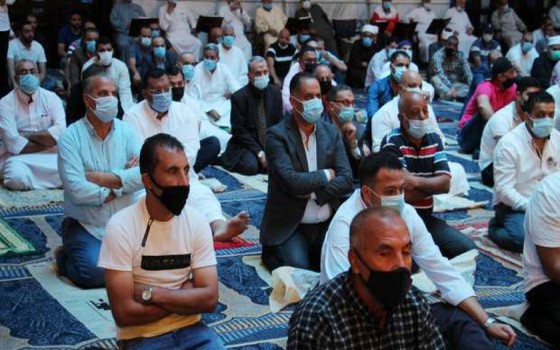
On the International Day to Combat Islamophobia.. Guterres: The message of Islam, which carries the meanings of peace and mercy, has been inspiring people all over the world for more than a thousand years.. Terrorism cannot be linked to any religion or nationality

- Europe and Arabs
- Wednesday , 15 March 2023 15:8 PM GMT
Brussels: Europe and the Arabs
For the first time, the United Nations commemorates the International Day against Islamophobia, corresponding to today, Wednesday, March 15th. On this occasion, the United Nations said in a statement on its website, "We celebrate this day in order to affirm that terrorism and violent extremism leading to terrorism in all its forms and manifestations cannot and should not be linking them to any religion, nationality, civilization or ethnic group.” For his part, Secretary-General Antonio Guterres said, “The message of Islam, which carries the meanings of peace, mercy and benevolence, has been inspiring people all over the world for more than a thousand years.
According to the United Nations statement, “Islamophobia or Islamophobia — or what is known as: “Islamophobia” — is fear of Muslims, prejudice against them, and prejudice against them, leading to provocation, hostility, and intolerance through threats, harassment, abuse, incitement, and intimidation of Muslims and non-Muslims, whether on the ground or on the Internet. This hatred - motivated by institutional, ideological, political and religious hostility that transcends these frameworks into structural and cultural racism - targets symbols and signs indicating that the targeted individual is a Muslim.
This definition underscores the link between institutional levels of Islamophobia and manifestations of such attitudes that are fueled by the emergence of a perceived Muslim victim identity. This approach also interprets Islamophobia as a form of racism, where Islamic religion, traditions and culture are seen as a “threat” to Western values.
Some experts prefer the label “anti-Muslim hatred” lest the term “Islamophobia” lead to condemnation of all criticism of Islam, thus stifling freedom of expression, since international human rights law protects individuals, not religions. Islamophobia may also affect non-Muslims, due to a confusion based on perceptions of nationality, racial origin, or ethnic origin.
an epidemic of hate
A recent report by the UN Special Rapporteur on Freedom of Religion or Belief stated that suspicion, discrimination and outright hatred towards Muslims have reached epidemic proportions.
In countries where they are a minority, Muslims often experience discrimination in accessing goods and services, in finding work and in education. In some countries, they are denied citizenship or legal immigration status due to xenophobic perceptions that Muslims are national security and terrorism threats. Muslim women are disproportionately targeted for Islamophobic crimes.
In the aftermath of the terrorist attacks of September 11, 2001 and other horrific acts of terrorism allegedly carried out in the name of Islam, institutional mistrust of Muslims and perceived Muslims has grown to epidemic proportions. Adeed International - along with regional and international bodies - responded to security threats by adopting measures that target Muslims more than others and define Muslims as people who pose a great danger and people who are at risk of extremism. Laws, policies and practices have also perpetuated harmful stereotypes and tropes that portray Muslims, their beliefs and cultures as a threat, based on long-established imperial reductionisms that regard Muslims as “others” in cultural terms. These pervasive misconceptions and offensive stereotypes have perpetuated discrimination, hostility and violence towards Muslims, as individuals and groups. In countries where Muslims are a minority, they are often subjected to discriminatory practices when seeking goods, services, businesses and education. In some countries, they are denied citizenship or immigration status because of xenophobic perceptions that cast Muslims as national security threats and terrorists. Muslim women are also specifically targeted for crimes linked to Islamophobia. Studies indicate that the number of anti-Islamic hate crimes increases frequently after the occurrence of what is considered beyond the control of most Muslims, including terrorist attacks and holding annual celebrations of such attacks. This motivating reality illustrates how Islamophobia places responsibility for the actions of a very few on the ruler of all Muslims, thus fueling inflammatory rhetoric.
Combating Islamophobia “Islamophobia”
Many governments have taken concrete action to combat Islamophobia by putting in place anti-hate crime legislation and measures to prevent and prosecute hate crimes, and by launching public education campaigns about Muslims and Islam with the aim of dispelling myths and misconceptions. Considering all of the above, the sixty member states of the Organization of Islamic Cooperation adopted a resolution adopted by the United Nations General Assembly defining March 15 as the International Day for Combating Islamophobia. The resolution document stresses that terrorism and violent extremism cannot and should not be associated with any religion, nationality, civilization or ethnic group. It also calls for encouraging a global dialogue on promoting a culture of tolerance and peace at all levels, based on respect for human rights and the diversity of religions and beliefs. On the occasion of the first observance of the first International Day Against Islamophobia in 2021, UN Secretary-General António Guterres noted that anti-Muslim bigotry is part of a broader trend of the resurgence of ethno-nationalism, neo-Nazism, stigma and hate speech targeting vulnerable populations, including Muslims and Jews. And some Christian minorities and others, pointing out that the Holy Qur’an reminds us that peoples and tribes were created to get to know one another, and that diversity is rich and not a threat.
In response to the alarming rise of hate speech around the world, Secretary-General António Guterres launched the United Nations Strategy and Action Plan on Hate Speech












No Comments Found